

Pancreatitis. This guideline covers managing acute and chronic pancreatitis in children, young people and adults.
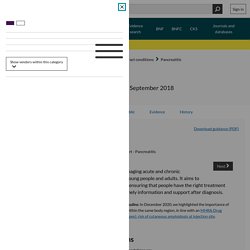
It aims to improve quality of life by ensuring that people have the right treatment and follow-up, and get timely information and support after diagnosis. Your responsibility The recommendations in this guideline represent the view of NICE, arrived at after careful consideration of the evidence available. When exercising their judgement, professionals and practitioners are expected to take this guideline fully into account, alongside the individual needs, preferences and values of their patients or the people using their service. It is not mandatory to apply the recommendations, and the guideline does not override the responsibility to make decisions appropriate to the circumstances of the individual, in consultation with them and their families and carers or guardian.
Acute Pancreatitis: Exploring Nutrition Implications - Murphy - 2020 - Nutrition in Clinical Practice. Diseases of the pancreas vary by type, etiology, pathophysiology, and outcomes.
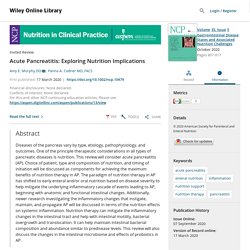
One of the principle therapeutic considerations in all types of pancreatic diseases is nutrition. This review will consider acute pancreatitis (AP). Choice of patient, type and composition of nutrition, and timing of initiation will be discussed as components for achieving the maximum benefits of nutrition therapy in AP. The paradigm of nutrition therapy in AP has shifted to early enteral and/or oral nutrition based on disease severity to help mitigate the underlying inflammatory cascade of events leading to AP, beginning with anatomic and functional intestinal changes.
Additionally, newer research investigating the inflammatory changes that instigate, maintain, and propagate AP will be discussed in terms of the nutrition effects on systemic inflammation. Meta‐Analysis of Efficacy of Rhubarb Combined With Early Enteral Nutrition for the Treatment of Severe Acute Pancreatitis - Chen - 2020 - Journal of Parenteral and Enteral Nutrition. Background Whether to provide rhubarb combined with early enteral nutrition (rhubarb/EEN) to patients with severe acute pancreatitis (SAP) remains controversial.
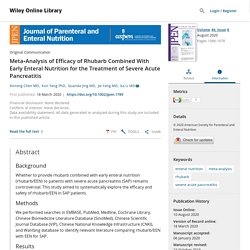
This study aimed to systematically explore the efficacy and safety of rhubarb/EEN in SAP patients. Methods We performed searches in EMBASE, PubMed, Medline, Cochrane Library, Chinese Biomedicine Literature Database (SinoMed), Chinese Scientific Journal Database (VIP), Chinese National Knowledge Infrastructure (CNKI), and Wanfang database to identify relevant literature comparing rhubarb/EEN with EEN for SAP.
Results Eleven randomized controlled trials (724 patients) were included. Conclusions. ESPEN guideline on clinical nutrition in acute and chronic pancreatitis - Clinical Nutrition. 13.What are the risks of developing malnutrition in patients with CP?
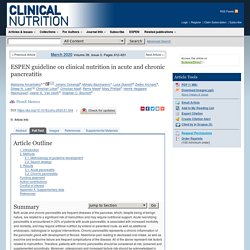
Statement 2 Risk of malnutrition in CP is high and malnutrition is common in patients with CP. Strong consensus (100% agreement). Commentary 14.What are the causes of malnutrition in patients with CP? Pancreatic insufficiency, abdominal pain, alcohol abuse, lower food intake, diabetes mellitus and smoking are the main causes of malnutrition in CP. Strong consensus (97% agreement). 15.Which diagnostic tests are preferred to assess nutritional status in patients with CP? Nutritional status should be assessed according to symptoms, organic functions, anthropometry, and biochemical values. Grade of Recommendation GPP – Strong consensus (97% agreement). 16.What is the frequency of screening for micro- and macro-nutrient deficiencies in patients with CP?
Grade of Recommendation GPP – Strong consensus (100% agreement). Patients with CP do not need to follow a restrictive diet. Strong consensus (94% agreement). Recommendation 21. ACG Clinical Guideline: Chronic Pancreatitis : American Journal of Gastroenterology. Pancreatic Disease & Nutrition Therapy: Nutrition in Clinical Practice: Vol 34, No S1. Practical guide to the management of chronic pancreatitis. Nutrition and Inflammatory Biomarkers in Chronic Pancreatitis Patients - Greer - 2019 - Nutrition in Clinical Practice.
Background Chronic pancreatitis (CP) patients frequently experience malabsorption and maldigestion, leading to micronutrient and macronutrient deficiencies.
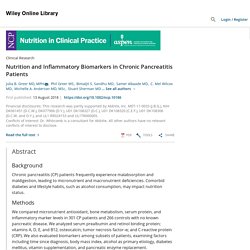
Comorbid diabetes and lifestyle habits, such as alcohol consumption, may impact nutrition status. Methods We compared micronutrient antioxidant, bone metabolism, serum protein, and inflammatory marker levels in 301 CP patients and 266 controls with no known pancreatic disease. We analyzed serum prealbumin and retinol binding protein; vitamins A, D, E, and B12; osteocalcin; tumor necrosis factor‐α; and C‐reactive protein (CRP). Results After correcting for multiple comparisons, CP patients had significantly lower levels than controls of the following: vitamin A (40.9 vs 45.4 μg/dL) and vitamin E (α‐tocopherol [8.7 vs 10.3 mg/L] and γ‐tocopherol [1.8 vs 2.2 mg/L]), as well as osteocalcin (7.9 vs 10 ng/mL) and serum prealbumin (23 vs 27 mg/dL).
Conclusions. Pragmatic Management of Nutrition in Severe Acute Pancreatitis. Guidance and guidelines. Nutritional Considerations in Pediatric Pancreatitis: A Pos... : Journal of Pediatric Gastroenterology and Nutrition. What Is Known/What Is New What Is Known Nutritional care of children with pancreatic disorders varies widely.
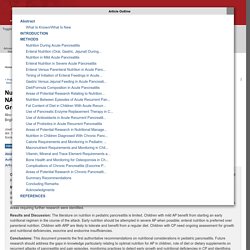
Guidance and guidelines. This guideline covers managing acute and chronic pancreatitis in children, young people and adults.
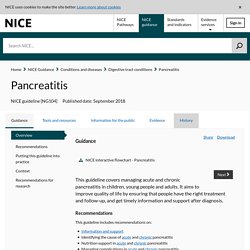
It aims to improve quality of life by ensuring that people have the right treatment and follow-up, and get timely information and support after diagnosis. Your responsibility The recommendations in this guideline represent the view of NICE, arrived at after careful consideration of the evidence available. When exercising their judgement, professionals and practitioners are expected to take this guideline fully into account, alongside the individual needs, preferences and values of their patients or the people using their service. It is not mandatory to apply the recommendations, and the guideline does not override the responsibility to make decisions appropriate to the circumstances of the individual, in consultation with them and their families and carers or guardian. UEG evidence-based guidelines for the diagnosis and therapy of chronic pancreatitis.
A Practical Guide to the Nutritional Management of Chronic Pancreatitis.